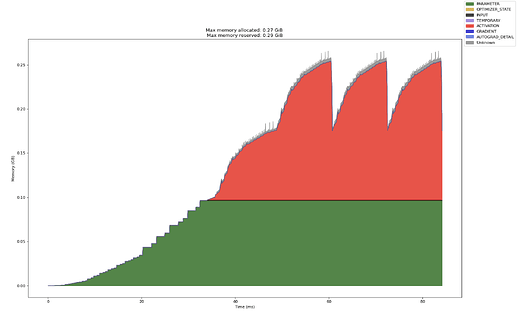Hi everyone,
I have a question regarding the memory profiling results of ResNet.
I followed the tutorial from the PyTorch blog. The main difference in my case is that I profiled the memory usage during the inference step, rather than training.
I profiled the model-building process and 4 iterations of inference.
Below is a snapshot of the memory usage visualization.
My question is: why does the memory footprint of the first iteration (inference) appear significantly smaller compared to subsequent iterations?
Below is my full code for reference.
# (c) Meta Platforms, Inc. and affiliates.
import logging
import socket
from datetime import datetime, timedelta
import torch
from torch.autograd.profiler import record_function
from torchvision import models
logging.basicConfig(
format="%(levelname)s:%(asctime)s %(message)s",
level=logging.INFO,
datefmt="%Y-%m-%d %H:%M:%S",
)
logger: logging.Logger = logging.getLogger(__name__)
logger.setLevel(level=logging.INFO)
TIME_FORMAT_STR: str = "%b_%d_%H_%M_%S"
def trace_handler(prof: torch.profiler.profile):
# Prefix for file names.
host_name = socket.gethostname()
timestamp = datetime.now().strftime(TIME_FORMAT_STR)
file_prefix = f"{host_name}_{timestamp}"
# Construct the trace file.
prof.export_chrome_trace(f"{file_prefix}.json.gz")
# Construct the memory timeline file.
prof.export_memory_timeline(f"{file_prefix}.html", device="cuda:0")
def run_resnet50(num_iters=4, device="cuda:0"):
with torch.profiler.profile(
activities=[
torch.profiler.ProfilerActivity.CPU,
torch.profiler.ProfilerActivity.CUDA,
],
record_shapes=True,
profile_memory=True,
with_stack=True,
on_trace_ready=trace_handler,
with_modules=True,
) as prof:
with record_function("## Prepare ##"):
model = models.resnet50().to(device=device)
inputs = torch.randn(1, 3, 224, 224, device=device)
model.eval()
for _ in range(num_iters):
with record_function("## forward ##"):
pred = model(inputs)
if __name__ == "__main__":
# Warm up
run_resnet50()
# Run the resnet50 model
run_resnet50()
Thanks in advance!
